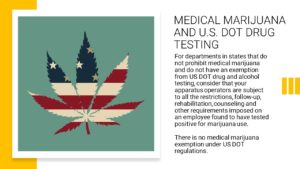Editor’s Note: This article was originally published Sept. 23, 2020 and has been updated.
The past few years have seen state legislative activity addressing use of medical and recreational marijuana and how employers may treat employees who use marijuana under such laws. This legislative activity will continue, so consider this article as a snapshot of the current state of medical marijuana law and regulation as of January 2022.
For our purposes, the question is this: May a fire department maintain a zero-tolerance drug testing policy that includes a blanket prohibition of the off-duty use of medical marijuana, or must it accommodate such use?
No state currently requires employers to permit the use of medical marijuana in the workplace or allow an employee to be under the influence of marijuana in the workplace. Several states also allow employers to discipline any employee for off-duty medical marijuana use; however, in at least 25 states the answer to the above question is not so clear. In addition, some of these state laws create a conflict with the Federal Drug Free Workplace Act (DFWA).
In this article, we address questions fire agencies have raised regarding federal grant requirements and whether they provide a basis for fire departments to maintain a zero-tolerance drug and alcohol workplace policy that prohibits firefighter medical marijuana use both on- and off-duty.
Some states provide a carve-out for employers to deny an accommodation for off-duty medical marijuana use if doing so would cause the employer to violate federal law.
We also discuss the various state medical marijuana laws that include anti-discrimination protections prohibiting employers from taking adverse employment actions against an employee for the lawful use of medical marijuana, the various types of exceptions to those state laws, and whether any exist that provide a basis for fire departments to continue to prohibit firefighter off-duty medical marijuana use as a best practice.
What the Federal Drug Free Workplace Act Says
Fire departments that are federal grant recipients must comply with the DFWA, and must, in part, do the following (41 U.S.C § 8103(a)(1)):
- Publish a statement notifying employees that the unlawful manufacture, distribution, dispensation, possession or use of a controlled substance is prohibited in the workplace and specifying the actions that will be taken against employees for violations of the prohibition.
- Ensure each employee receives a copy of the statement.
- Notify employees they must abide by the statement and notify the employer of any criminal drug statute conviction for a violation occurring in the workplace no later than five days after the conviction.
- Establish a drug-free awareness program to inform employees of the dangers of drug abuse in the workplace, the drug-free workplace policy, the available drug counseling, rehabilitation, and employee assistance programs and penalties that may be imposed on employees for policy violations.
- Discipline the employee or require satisfactory participation in a drug abuse assistance or rehabilitation program for any conviction of a criminal drug offense occurring in the workplace.
- Make a good faith effort to continue to maintain a drug-free workplace.
Regardless of what any state law says about employment protections for medical marijuana users, under the DFWA, agencies must prohibit the use of medical marijuana in the workplace. However, the DFWA does not require a grant recipient to prohibit an employee’s use of medical marijuana outside of the workplace. There is no loss of federal grant funding if a fire department fails to prohibit or impose discipline for employee off-duty medical marijuana use. Put another way, a fire agency that is a federal grant recipient must prohibit the possession and use of medical marijuana in the workplace, but is not required to prohibit possession or firefighter off-duty medical marijuana use.
What if My Fire Department Prohibits Off-Duty Use?
As of January 2022, states with no law legalizing medical marijuana include Georgia, Idaho, Indiana, Iowa, Kansas, Kentucky, Mississippi, Nebraska, North Carolina, South Carolina, Tennessee, Texas, Wisconsin, and Wyoming.
In these states fire departments can continue to maintain a zero-tolerance drug and alcohol policy that includes disciplining an employee for any medical marijuana use. Further, a blanket drug and alcohol testing policy may be used. The same is true in 11 states where medical marijuana is now legal, but where courts have held and/or state statutory provisions clearly provide that an employer may maintain a zero-tolerance drug testing policy and discipline an employee based solely on a positive drug test result. These states include Alabama, California, Colorado, Florida, Maryland, Michigan, Montana, New Mexico, Ohio, Oregon, and Washington.
A fire agency that is a federal grant recipient must prohibit the possession and use of medical marijuana in the workplace, but is not required to prohibit possession or firefighter off-duty medical marijuana use.
In the remaining states where medical marijuana is now legal, none require an employer to accommodate the use of medical marijuana or to allow an employee to be under the influence of marijuana in the workplace. Most, however, do include provisions in their state medical marijuana act prohibiting employment discrimination against lawful medical marijuana users, and may require an employer to accommodate an employee’s off-duty medical marijuana use or at least engage in the interactive process to determine if a reasonable accommodation can be made.
In the private sector, recent cases address this issue from a disability discrimination and accommodation standpoint and have ruled that an accommodation for off-duty medical marijuana use may be required by employers. To date, the question of whether a public safety agency employer must accommodate off-duty use of medical marijuana has not been addressed in any published court opinion.
At the same time, there are various state law carve-outs, or legal exceptions, commonly included in state medical marijuana laws. These carve-outs may provide an employer the right to deny an accommodation of firefighter off-duty medical marijuana use for at least some employees. The carve-outs generally fall into three general categories:
- Loss of federal funding
- Safety-sensitive positions
- Situations in which the fire department would violate federal law
Let’s examine each in greater detail.
#1: Loss of Federal Funding
Several state laws provide that anti-discrimination provisions protecting medical marijuana patients do not apply if accommodating medical marijuana use would cause the employer to lose federal funding. As federal grant recipients, fire departments are required, under the DFWA, to prohibit the possession and use of unlawful drugs in workplace. This includes medical marijuana since it is illegal under federal law. Keep in mind, though, there is no requirement in the DFWA that an employer prohibit an employee’s off-duty drug use. Therefore, the loss of federal funding carve-out does not justify a fire department’s denial of an accommodation and imposition of discipline for a firefighter’s off-duty medical marijuana use.
#2: Safety-Sensitive Positions
The safety-sensitive carve-outs found in some state medical marijuana laws typically provide, in part, that an employee is prohibited from performing any job duty while “under the influence” that “could result in a public or safety risk” or “endanger the health or well-being of any person.” Even absent such a safety-sensitive carve-out, we found no state law permitting an employee to be “under the influence” of medical marijuana at work, so this type of exception does not really add any additional cover for employers beyond reasonable suspicion testing.
Further, in most states with this statutory language, the phrase “under the influence” is not defined. Many of these state laws also say the determination whether an employee is “under the influence” cannot be based solely on a positive drug test result. This issue was addressed in a case out of Arizona, Whitmire v. Wal-Mart Stores Inc. (359 F.Supp.3d 761 (D. Ariz. 2019)), in which the federal district court held that while the Arizona Medical Marijuana Act does not protect employees under the influence of marijuana at work, the law specifically states, “a registered qualifying patient shall not be considered to be under the influence of marijuana solely because of the presence of metabolites or components of marijuana that appear in insufficient concentration to cause impairment.”
Therefore, in states where an employee must be found to be “under the influence” in order for the safety-sensitive carve-out to apply, it would not provide the basis for a blanket prohibition of firefighter off-duty medical marijuana use.
Oklahoma’s Medical Marijuana and Patient Protection Act, however, states “o employer may refuse to hire, discipline, discharge or otherwise penalize an applicant or employee solely on the basis of a positive test for marijuana components or metabolites, unless: … the position is one involving safety-sensitive job duties.” It goes on to define “safety-sensitive” as “any job that includes tasks or duties that the employer reasonably believes could affect the safety and health of the employee performing the task or others,” and provides a non-exhaustive list of examples, including “performing firefighting duties.”
Therefore, in Oklahoma, the statutory safety-sensitive carve-out would provide a basis for prohibiting firefighter off-duty medical marijuana use for at least some (and perhaps all) fire department members. However, until the scope of this exception as applied to public safety agencies is clarified by statutory amendment or published case decision, each agency will have to decide to which members it reasonably applies, in consultation with their legal counsel.
#3: The Fire Department Will Violate Federal Law
Some states also provide a carve-out for employers to deny an accommodation for off-duty medical marijuana use if doing so would cause the employer to violate federal law. Lexipol is not aware of any federal law that a fire department would violate by having to provide an accommodation. The only possible scenario would apply to fire department members authorized to carry weapons as a part of their employment, or in states where fire departments are prohibited from preventing a firefighter from carrying a personal weapon on duty.

Regardless of whether a state legalizes the use of medical marijuana, it is a Schedule I controlled substance under federal statute and illegal under federal law. Also, the Bureau of Alcohol, Tobacco, Firearms and Explosives (ATF) issued an open letter in 2011 to all federal firearms licensees putting them on notice that any person who uses marijuana is an unlawful user prohibited from possessing firearms or ammunition under 18 U.S.C. §§ 922 (d)(3) and (g)(3)—which bars the possession of firearms by, and sale of firearms to, unlawful drug users—regardless of whether their state has passed legislation authorizing marijuana use for medicinal purposes.
By issuing a firearm to a member who cannot legally possess a firearm under federal law because they hold a medical marijuana card, or permitting such an employee to carry a personal firearm while on duty, a fire department would be in violation of federal law. Also, while there is no case law or other legal authority stating that a fire department must revoke an already issued firearm from a member with a medical marijuana card, by allowing such a member to conduct agency duties using any firearm, the agency is condoning the commission of a federal crime. Allowing a member with the right to carry a firearm to use medical marijuana off-duty who is then involved in a use of force incident could also subject the department to liability on negligent hiring, negligent retention, vicarious liability or other grounds.
Therefore, a “cause employer to violate federal law” carve-out could provide a basis for agencies to refuse an accommodation of off-duty medical marijuana use for members authorized to use a firearm in the course of their duties. However, Lexipol has found no reported court decision to support this position.
The Bottom Line
Until a court holds that a fire agency may discipline all employees for off-duty use of medical marijuana, or state statutes are revised to provide that they may do so, fire departments risk violating state disability discrimination laws by issuing a blanket drug testing policy prohibiting all firefighter off-duty medical marijuana use in states where the duty to accommodate employees remains unclear.
Note
- A word about cannabidiol (CBD): Of the states listed that have no law legalizing medical marijuana, all except three (Idaho, Kansas and Nebraska) recognize the lawful use of CBD oil for treatment of certain medical conditions. Members using CBD oil for treatment of medical conditions recognized by state law may get a false-positive on a drug test. This issue, like most all substance-related matters, should be reviewed with legal counsel.
 SCOTT ESKWITT is Director of Fire Policy and Training Content for Lexipol. He is an active member of the Fair Haven (NJ) Fire Department, serving as Chief from 2012 to 2015. He is also a member of the Fair Haven First Aid Squad and the Red Bank (NJ) Fire Department. Scott is also an attorney and has spent his legal career advising municipalities and fire departments on risk management, human resources and labor relations issues. His undergraduate degree in Industrial & Labor Relations was received from Cornell University and his law degree from SUNY Law at Buffalo.
SCOTT ESKWITT is Director of Fire Policy and Training Content for Lexipol. He is an active member of the Fair Haven (NJ) Fire Department, serving as Chief from 2012 to 2015. He is also a member of the Fair Haven First Aid Squad and the Red Bank (NJ) Fire Department. Scott is also an attorney and has spent his legal career advising municipalities and fire departments on risk management, human resources and labor relations issues. His undergraduate degree in Industrial & Labor Relations was received from Cornell University and his law degree from SUNY Law at Buffalo.
 CLAUDINE ABRAHAM is an attorney with Lexipol. She has more than 20 years of legal experience representing employers in civil matters relating to negligence, civil rights, and employment law. She received her undergraduate degree from the University of San Diego, and her law degree from the University of San Diego, School of Law.
CLAUDINE ABRAHAM is an attorney with Lexipol. She has more than 20 years of legal experience representing employers in civil matters relating to negligence, civil rights, and employment law. She received her undergraduate degree from the University of San Diego, and her law degree from the University of San Diego, School of Law.
